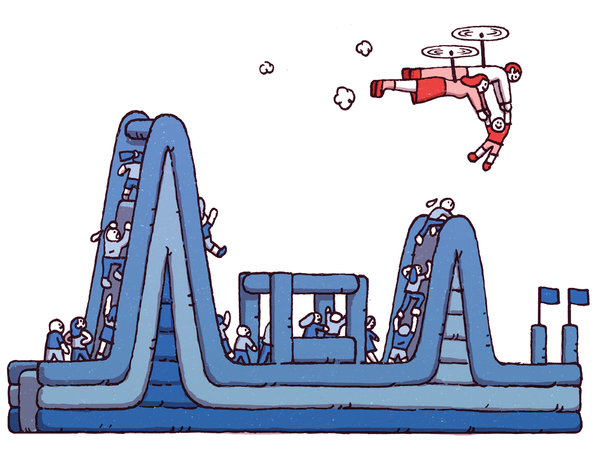 |
| Wren McDonald for the New York Times |
Last night’s emailed Evening Briefing from the New York Times had this thought-provoking entry:
In one of our most read stories of the day, a contributing Opinion writer takes an unusual
stance on helicopter parenting: It works.
Pamela Druckerman,
an American journalist who lives in Paris, cites research by an economist at
Yale and another at Northwestern collected in a new book, “Love, Money and
Parenting: How Economics Explains the Way We Raise Our Kids.” They found that
an “intensive parenting style” correlated with higher test scores, and kids
less likely to use drugs, smoke or abuse alcohol, and more likely to delay sex.
“It’s true that
high-octane, hardworking child-rearing has some pointless excesses, and it
doesn’t spark joy for parents,” Ms. Druckerman writes. “But done right, it
works for kids, not just in the United States but in rich countries around the
world.”
Well, it may work to give the kids
“higher test scores,” etc., but it doesn’t prepare them well for living.
Helicopter parenting isn’t a relatively new phenomenon, though it was given a
name only fifty years ago. I know several people raised by helicopter parents.
They hardly know how to wash a dish or prepare a simple meal – thank heavens
for restaurants and takeout – and they’ve not even got basic housekeeping
skills. Making a bed is beyond them. They’re successful in their chosen fields,
are moneyed, and are quite socially active. They travel widely and participate
in a wide range of pastimes and sports. Because they can, they’ve amassed a lot
of clothing and other possessions. To both save them time and do the thing they
haven’t the foggiest notion how to do, they keep in their tablets up to date with the contact
info for services like their housekeeping crew, their pet sitter, landscaper,
their personal trainer, and their dry cleaning pickup. I suppose it all spurs
our economy. That’s why helicopter parenting works in the rich countries. It
boosts the gross national product.
Yes, they really don’t use drugs,
smoke, or abuse alcohol, and perhaps they delayed sex. I’m not privy to that
and I don’t care. But many are divorced, are in therapy, have to have live-in
help of one kind or another, and are generally dissatisfied with life. Some
realize what has happened to them, but some are hovering over their own
offspring. I wish I could help them. As my mother would have said, “I feel for
them, but I can’t reach them.”
No comments:
Post a Comment